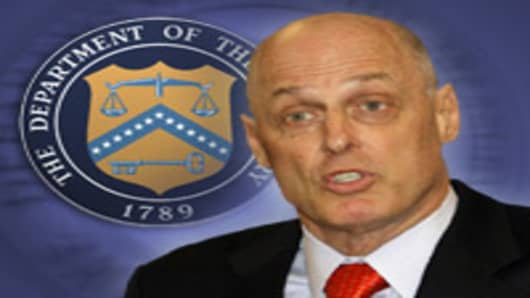Treasury Secretary Hank Paulson briefed Congressional leaders on plans to address the "illiquid assets" on U.S. financial institutions' balance sheets, possibly including the creation of a government facility to take on financial firms' bad debts.
The proposal to create a massive facility to buy mortgage-backed securities could cost as much as a half-trillion-dollars and would involve the purchase of both private-label and government-guaranteed mortgages, according to an administration official.
The plan would have two parts. The largest part would be the purchase of private-label (those underwritten by Wall Street) mortgages by some as-yet unnamed vehicle. Financing would occur through the sale of treasuries, the official said. That part of the plan would require congressional approval. The idea is to hold the securities to maturity. The average mortgage has a life of about 7 years.
A second part of the plan would involve the purchase by Treasury of additional government-backed (Fannie Mae and Freddie Mac) under a plan it announced several weeks ago to rescue the two government-sponsored entities. Back then, it said it would purchase $5 billion initially. The idea is to ramp up those purchases more quickly. It does not require approval by Congress.
The administration is contemplating hiring a private investment manager to run the mortgage vehicle. Yet to be worked out with Congress are the amount of mortgage securities the government would buy and from whom the government would accept them.
The price to be set on those purchases and the process for setting it was also unknown.
CNBC first reported the creation of a Treasury plan, similar to the Resolution Trust Corp., that would take mortgage backed securities off the market.
Paulson briefed House Speaker Nancy Pelosi and other congressional leaders at a meeting on Thursday night. Following the meeting, Paulson said the group's discussion focused on financial institutions' illiquid assets. "What we are working on now is an approach to deal with the systemic risk and stresses in our capital markets," Paulson said.
"As we've said for some time, the root cause for the stress in the capital markets is the real estate correction and what's going on in terms of the price declines in real estate," he said. "We're coming together to work on an expeditious solution, which is aimed right at the heart of this problem, which is illiquid assets on financial institutions' balance sheets."
Charlie Gasparino breaks the story on Paulson's plan. Watch the accompanying video.
A Treasury statement said Paulson and Bernanke were exploring all options available to them and would work with congressional leaders through the weekend. A government official speaking to CNBC ruled out any formal announcements Thursday or Friday.
The meeting, held at Pelosi's office, included House Financial Services Chairman Barney Frank, Senator Majority Leader Harry Reid, other Senate and House leaders from both political parties, Federal Reserve Chairman Ben Bernanke, and SEC Chairman Christopher Cox.
The Bush administration wants to make sure Congress is behind the idea before it moves ahead on the plan, a source told CNBC. Pelosi, a Democrat, said in a letter to Bush Thursday that the worsening economy demands another bipartisan economic recovery effort, and that Congress will stand ready beyond the Sept. 26 scheduled adjournment date to consider legislation.
The creation of a government facility for bad debts, according to its advocates, would allow banks to shovel bad debt off their balance sheets and allow the firms to go back to business as usual. It would also eliminate the need for individual company bailouts.
In turn, that could allow the housing market to recover because it would restore banks willingness to lend.
A federal government plan could also involve FDIC-type protection for money market funds, according to a report in the Wall Street Journal.
"This will bring real trust back into the market." Donald Marron, chairman of Lightyear Capital, said on CNBC. "It would free up real, spendable capital in these organizations. They can use that to make loans, to make transactions and to build confidence in the system. This is a confidence crisis."
The news sparked a big rally in stocks after a day in which investors remained nervous about the spreading effects the global credit crisis.
The Treasury Department and Federal Reserve, which engineered an $85 billion rescue plan for insurer American International Group earlier this week, declined to comment.
The aide also pointed to an opinion piece in Wednesday's Wall Street Journal by former Federal Reserve Chairman Paul Volcker, former Comptroller of the Currency Eugene Ludwig and former Treasury Secretary Nicholas Brady in which they said such a body could buy up troubled real estate debt to get credit markets working again.
For Investors
- Are Stocks Low Enough to Buy Now?
- Is Your Money-Market Fund Safe? Find Out
- Slideshow: Biggest Chapter 11 Cases in US History
- Eight Tips for Investing in Hard Times
- Need Safety? Take a Look at Bonds
- What If You're a Client of Lehman, Merrill or AIG?
- Have an AIG Insurance Policy? Don't Fret
- How You Can Protect Your Money
However, getting Congress to approve such a plan quickly would likely be difficult because lawmakers plan to leave by the end of the month to campaign for the Nov. 4 election.
White House spokeswoman Dana Perino declined to comment on what steps, if any, the Bush administration was considering.
She also questioned whether doing something in the middle of a market correction was wise and acknowledged it could be difficult to approve something quickly.
"I think Democrats themselves, and maybe some Republicans, have questioned whether or not they will be able to get anything done in the next two weeks," Perino said.
"And it probably isn't that smart to try to finalize legislation in the middle of a market correction as we're trying to figure out what other possible necessary steps may or may not need to be taken as we move forward," she said.
Earlier Thursday, Sen. Charles Schumer, D-NY, told reporters he has spoken with officials at the Treasury Department and Federal Reserve about trying to do something more permanent.
"I think both the Federal Reserve and the Treasury are realizing that we need a more comprehensive solution," he said. "You can't just keep...having the government take over one company after another without really solving the problem," Schumer said.
Schumer was also present at Thursday night's meeting in Washington.
—Reuters contributed to this report.



